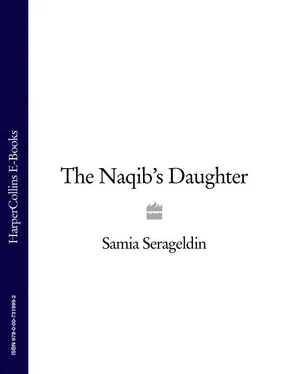Before them all, Murad had laid out his strategy: to split their cavalry forces in two, with Ibrahim Bey and his men camped on the east bank of the Nile and Murad and Elfi on the west. This plan had immediately seemed disastrous to Elfi. In vain he had argued that they should mass all their forces on the far bank of the river, where they would have the advantage of forcing the French to cross over to meet them. Murad had dismissed this on the grounds that the French might advance along either bank or both at once. Elfi countered that any doubts regarding the direction from which the French were advancing could be settled by sending out Bedouin scouts. But Murad had remained immovable and maddeningly dismissive of the enemy’s forces. Elfi had even ridden back with Murad to his house at dawn to try to change his mind, but Murad had refused to see reason.
And this morning, as Elfi gave the order to his Mamlukes to prepare for battle and to gather at the Citadel, he was thinking that his oath of fealty to his former master might never cost him, or the city, dearer.
Sitt Nafisa heard Murad’s heavy tread on the stone steps leading to her rooms and dismissed her maids with a quick flicker of her fingers. Murad was in full battle regalia, splendidly attired in vivid tunic and pantaloons, his chest festooned with gold chains, his fingers encrusted with precious stones, bejewelled sword hanging at his side and burnished pistols tucked into his scarlet sash. Nafisa guessed that his shaved head must be perspiring under the turban, and that the sable-lined cloak over his shoulders must weigh on him unbearably in the July heat. The French consul Magallon – in the days when he and his wife used to call on Nafisa regularly – had once asked her why Mamlukes made themselves such a rich prize in battle, giving the enemy incentive to kill them expressly to pillage the corpses. ‘Truly, à la guerre comme à l’amour , hmm?’ Magallon had smiled quizzically. It was just the Mamluke custom, she had explained; they were a military caste. Perhaps it was their way of defying fate.
To a casual observer, Murad might not appear to be a man preoccupied by thoughts of an imminent meeting with destiny, but Nafisa could read him under his bluster. The scar from a sword slash across his face had turned livid, as it did whenever he was in the heat of argument or battle.
‘We set off from the Citadel at noon, and we will cross the river and wait for the French at Imbaba. Ibrahim Bey has already made camp on the eastern bank.’
Nafisa nodded. All morning she had heard the kettledrums booming and the shrill pipes playing as the cavalcade of horsemen pranced through the winding streets on their way uphill to the Citadel.
‘The French won’t reach Cairo.’ Murad’s red beard bristled like a burning bush. ‘They may have taken Alexandria, but they won’t reach Cairo, nevertheless you may leave if you wish. Ibrahim Bey is evacuating his women; you can join his train. I can spare a small Mamluke escort for you, and of course you can take your maids and eunuchs.’
‘I won’t leave Cairo, whatever happens. Who will be left if I do?’ She had been brought to Cairo as a two-year-old and sold into a great house; she remembered nothing else. ‘I know Ibrahim Bey’s daughter Adila will stay also, and many of the other women. Don’t worry, about us – this is not the Mongols sacking Baghdad. But I’ll move some of the coffers of coins and jewels to our other houses in Cairo for safe-keeping, just in case there is any lawlessness – or if we need to pay a ransom.’
He nodded. ‘Send some valuables to the Giza estate,’ he said, turning to go.
‘Wait. What about the European merchants? A mob might attack them; people are restless in the streets, and fear makes them dangerous. We should take the Europeans into our houses for protection.’
‘You and your precious Franj! It’s your friend Magallon who has been agitating for this war against us.’ He turned on his heel. ‘Take the Europeans into our houses if you want – you won’t have room for all of them.’
‘I’ll ask Sitt Adila to open her doors to them also; between us we can try to accommodate anyone who seeks refuge.’
‘Do as you please.’ Murad was already at the door, his mind on other matters. ‘May I next see your face in good health.’ He raised his hand in farewell.
As she heard the familiar formula of leave-taking, Nafisa shuddered with a premonition that she would not see his face again. She dismissed it instantly; she was not the type to heed such intuitions and she had much to do.
‘Bilsalama. Go with God, and return safely.’
Outside the window the murmur of the city was turning to a dull roar of alarm.
TWO
The Battle of the Pyramids
‘This was the first year of the fierce fights and important incidents, of the multiplication of malice and the acceleration of affairs; of successive sufferings and turning times.’
Abdel Rahman El-Jabarti’s Chronicles of Egypt,
15 June, 1798
‘Are you writing, child?’
Zeinab raised her head from the page and looked up at Shaykh Jabarti. How old was the venerable historian, she wondered. At least as old as her father, Shaykh Bakri, and he was two score years; she herself, at twelve, was her parents’ second youngest child and only unmarried daughter. As she was serving her father pomegranate juice one evening last month, he had suddenly looked at her and turned to her mother. ‘Is she a woman yet?’ he had asked. And her mother had blushed and murmured that she was indeed, had been for four cycles of the moon now.
‘Then we should get her married,’ her father had pronounced, pinching Zeinab’s cheek where it dimpled. ‘Let me think on it.’
Zeinab had wondered whom he might have in mind, and hoped it would not be someone as old as the man her sister had married. But of course her father had not had time to think on it, with the news of the English ships off Alexandria, and now the French advancing to the outskirts of Cairo.
Shaykh Jabarti’s dictation trailed off; he was staring out of the window and stroking his beard, a world away. Zeinab waited quietly, chewing on the end of the ribbon tied around her thick, long black plait. She bent over the silver bowl of rose-water set on the table in front of her and studied her wavering reflection. Like the princesses of fairy tales, her face was as round and white as the full moon, but her eyes were large and dark and her fine black brows arched over them like birds winging over a still pool in moonlight. She blew at the rose petals in the water and the image dissipated.
‘Are you writing, child?’ Shaykh Jabarti said again, absent-mindedly, and she picked up her quill and waited. She had a fine hand, and for that reason, and because he had tired eyes and preferred to dictate his chronicle, Shaykh Jabarti tolerated her presence as his pupil and scribe. It was very unusual for a girl to be so honoured, and in fact it had been her younger brother, originally, who had been sent to learn at Shaykh Jabarti’s feet, but her brother was only interested in spinning a wheel around a stick, as he was doing right now outside the window. It was Zeinab, sent with him as an afterthought, who had proved an apt pupil. She wondered how much longer her father would allow her to receive instruction from Shaykh Jabarti. Once she was married, of course, it would be out of the question.
She had heard that the French had brought a new invention that could make calligraphy and scribes obsolete, a machine that could make many, many copies. As they advanced south towards Cairo, they had distributed countless thousands of copies, in Arabic, of their chief general’s proclamation. Shaykh Jabarti was holding a copy at that very moment and snorting as he parsed the words for hidden meanings and for lapses in Arabic grammar and syntax.
Читать дальше












